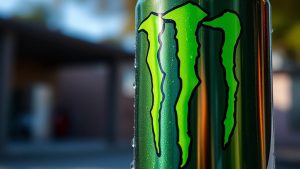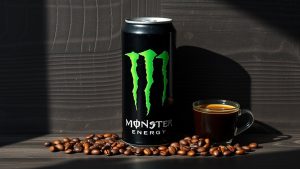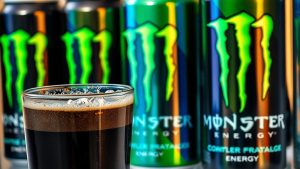
Monster Energy Drinks contain about 210 calories and 54 grams of sugar per 16 oz can, indicating a high sugar content that can exceed daily limits. Each can packs around 160 mg of caffeine, roughly equivalent to four cups of coffee, which can lead to jitteriness or anxiety for some individuals. Additionally, they include ingredients like taurine and B vitamins aimed at enhancing energy. Understanding the implications of these facts is essential for making informed choices.
When it comes to energy drinks, Monster Energy stands out with its distinct nutritional profile. Each 16 oz can packs about 210 calories, which might be significant if you're monitoring your daily intake. Importantly, it contains zero grams of fat, making it a fat-free option for those looking to avoid dietary fats.
However, you should be aware that it contains approximately 370mg of sodium, which represents about 16% of the daily recommended intake. This sodium level can quickly add up, especially if you're consuming other salty foods throughout the day.
In terms of carbohydrates, a typical can of Monster Energy contains around 55 grams. This high carbohydrate content primarily comes from sugars, with about 54 grams of sugar per can. If you're keeping an eye on your sugar consumption, this amount exceeds the daily recommended intake for many individuals. High sugar levels can lead to various health issues, including obesity and diabetes, if not consumed mindfully.
Caffeine is one of the key ingredients that sets Monster Energy apart from other beverages. With around 160 mg of caffeine per can, it provides a significant energy boost, equivalent to roughly four cups of coffee. This caffeine content can enhance alertness and performance but also comes with potential side effects. You might experience jitteriness, anxiety, or insomnia, particularly if you're sensitive to caffeine.
In addition to caffeine, Monster Energy contains several other stimulants. Taurine, an amino acid often linked to performance enhancement, is included alongside guarana extract, which also contributes to the drink's energy-boosting properties.
B vitamins like B3, B2, B6, and B12 play a role in energy metabolism, while L-Carnitine is included for its debated effectiveness in energy enhancement. Notably, there are also zero sugar options available, which contain virtually no sugar and only about 10 calories per serving.
For those concerned about sugar and calorie intake, Monster Energy offers zero sugar alternatives. These options contain virtually no sugar and only about 10 calories per serving. They utilize sugar substitutes like sucralose and acesulfame potassium to maintain flavor without the added sugars. This can be an appealing choice for individuals looking to reduce their caloric intake while enjoying the same flavorful experience.
While the ingredients in Monster Energy drinks can provide immediate energy, they shouldn't serve as a substitute for a balanced diet. Regular consumption can lead to excessive caffeine and sugar intake, which can have health implications.
You should consider the broader context of your diet and lifestyle, ensuring you're not compromising essential nutrients for the sake of energy drinks.
Conclusion
So, if you're looking to power through your day with a little help from Monster Energy drinks, just remember: you're signing up for a wild ride of caffeine and sugar. Who needs sleep when you can have a neon-colored concoction that promises to turn you into a productivity machine? Just be prepared for the inevitable crash—after all, what's life without a bit of irony? Drink responsibly, and may your energy levels be ever in your favor!



